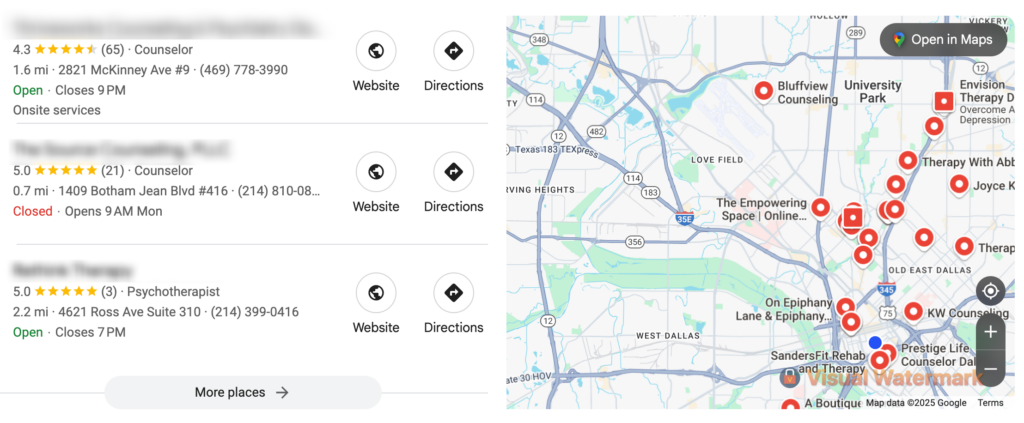What if your next client didn’t come from Instagram, a Facebook group, or a word-of-mouth referral—but from Google? What if clients found you without needing to scroll, post, or wait? That’s the kind of simplicity SEO for therapists offers.
SEO is a sustainable, organic marketing approach that helps you attract more of the right clients—those actively searching for help—by increasing your visibility online. It’s about showing up when it matters most and creating a system that brings in aligned inquiries consistently (without the constant content grind).
If you’re ready to spend less time chasing leads and more time focusing on what you love—your therapy practice—this guide to SEO for therapists is for you.
Why Therapists Need a Simple SEO Strategy
You don’t need to be everywhere to be found—you just need to show up when someone is actively using search to find support.
An intentional SEO strategy helps Google understand what your practice offers and who you serve. It also helps your future clients feel confident that they’ve landed in the right place.
SEO isn’t just about clicks—it’s about trust, visibility, and connection. The purpose of SEO for therapists isn’t just traffic. It’s about connecting with people who are already looking for your services—whether that’s “trauma therapist in Austin” or “grief counseling for new parents.” These search terms signal intent, and with the right SEO strategy, your site becomes the answer.
A complete Google Business profile, strong reviews, and clear messaging improve your credibility and search rankings. Being visible on Google, especially with a solid Google Business profile and client reviews, tells people you’re not only credible—you’re the right fit. In fact, nearly 75% of people say positive Google reviews make them trust a business more.
Just remember: SEO is a long game. Most therapists start seeing traction between 3–6 months, depending on your site’s health, your keywords, and how consistently you’re showing up.
How Search Works for Therapists
Think of search as a conversation your client is already having. When someone types “anxiety therapy for teens in Atlanta” into Google, they’re not passively browsing—they’re actively looking for support.
Your goal is to be the title they see and the link they click. Showing up in relevant search results means meeting your future clients exactly where they are, using the words they’re already typing.

5 Ways to Increase Your Clientele as a Therapist Using SEO
Now that we’ve covered what SEO can do for your practice, let’s break down strategies on how to do it. Start by focusing on just a few aspects of SEO — it can become very overwhelming if you try to do too much too fast.
Here are five tips to get started:
#1. Keyword Research for Therapists: What to Focus On

Let’s talk about your keyword strategy. Your practice is unique, which means your keyword strategy should reflect that. Keyword research helps you identify phrases people are actively using when they search for support like yours.
Start with a primary keyword that reflects your core service, like “grief therapist in Phoenix.” Then layer in secondary keywords to support different specialties or modalities.
You’ll want to use a mix of long-tail (specific, lower competition) and short-tail (high traffic) keywords. Some examples include:
- Therapy for couples in [City]
- Trauma therapy
- Online therapy
- Anxiety therapy [City]
- Depression therapy in [City]
- Trauma-informed therapy for adults
Did you notice how specific those keywords are? These search terms help you show up in your local area for people who are actively looking for help with specific issues. There’s no chance someone would accidentally end up on your website. They know exactly what they’re looking for and are confident you can help them.
Primary vs. Secondary Keywords (And Why Both Matter)
Your primary keyword is your anchor. It’s what the whole page is built around. Your secondary keywords support the page and give context to Google, helping it understand all the topics your content covers.
For example:
- Primary: “Postpartum depression therapist in Houston”
- Secondary: “motherhood mental health,” “therapy after birth trauma,” “emotional support after delivery”
Use both types of keywords throughout your page headings, body text, and image alt text. This helps boost your visibility and improves how your site ranks.
#2. Local SEO for Therapists (Be Found in Your Own City)

As a therapist, it’s important to take advantage of local SEO. Use local keywords naturally in your site copy, images, and metadata (your city, neighborhood, or region). Then, set up or optimize your Google Business profile to help your practice appear in search results for people nearby.
This listing isn’t just helpful—it’s crucial. It includes:
- Contact info
- Business title and description
- Photos and service areas
- Links to your site and social channels
- And of course, reviews
All of this makes it easier for people to learn about your practice and contact you—and for Google to recommend your practice in local searches.
#3. Make Sure Your Website is Built for Performance

Your website design and performance affect your rankings more than you might expect.
Did you know how your website is built can impact your SEO? Or the way your audience navigates and experiences your website can affect it too? This is where improving your technical SEO — or website performance — can really make a difference.
I’ve worked with many therapists who had great services but weren’t showing up online because their site lacked SEO structure. A clean, fast, and accessible site is the backbone of any SEO strategy for therapists.
Your website should feel simple and easy to navigate—for both humans and search engines.
Even small changes—like fixing broken links or compressing images—can support your visibility and user experience. SEO isn’t just about keywords; it’s also about how your website performs.
Your website should always be easy to navigate for your audience and Google. This means having a website designed for easy conversions and built using SEO best practices related to things like page loading speed, text structure (H1, H2s, paragraphs, etc.), fixing broken links, and submitting your sitemap.
This kind of technical SEO supports your online presence and makes it easier for both clients and search engines to navigate your site.
#4. Website Content for Your Therapy Practice
A strong content strategy is crucial for your therapy practice. A lot of people do extensive research to find the right therapist for them. If you can answer their questions and provide value before they even reach out to you, you’re establishing yourself as an expert in your industry and someone they can trust.
Blogging may not feel natural at first, but writing from the heart about what your clients need help with can truly connect. Your content should reflect your voice and provide value—not just drive clicks.
Here are some blog ideas that support both search and service:
- What to expect in your first therapy session
- How to know if therapy is right for your teen
- Managing anxiety during life transitions
- Tips for navigating relationship conflict
- How mindfulness supports emotional regulation
Each post builds trust before a potential client ever reaches out—and that’s powerful.
Also don’t forget: web copy matters too. Your service pages, homepage, and even your about page should be keyword-aligned, clear, and speak directly to your audience. Every page is an opportunity to show up in search.
Still, your content isn’t limited to your blog posts, it also includes the copy on your web pages. Your web copy and other aspects of your on-page can impact your SEO performance. Any page with copy or content on it should consist of at least 300 words, be aligned with your keywords, and speak directly to your clients.
Blog posts, service pages, and even your FAQs all support your SEO—especially when they’re written with your therapy clients in mind. The more helpful and clear your site is, the better SEO works for therapists.
#5. Build Backlinks (It’s Easier Than You Think)
Backlinks are links from other websites that direct traffic to your website. They’re super important to improve your SEO ranking. It’s showing Google other people think your website is valuable.
Backlinks are typically underutilized by therapists because they tend to go hand in hand with PR. Still, there are plenty of ways to start building high-quality backlinks without a huge time commitment, like joining directories.
You can also build backlinks by:
- Submit your practice to therapist directories like Psychology Today.
- Guest post on reputable websites in the mental health field and include a link back to your website in your author bio or within the content (you can find a directory of guest posting opportunities here).
- Guest post on reputable mental health blogs
- Be a guest on podcasts about healing, burnout, or entrepreneurship
- Share your resources in online forums and communities
If you want to know how many backlinks you currently have, you can use an SEO tool like Mangools, Moz, or Semrush, or by checking directly in your Google Search Console.
How to Know If Your SEO is Working for You As a Therapist
While SEO for therapists does take time to show significant results, you should be able to start seeing small changes in your Google Search Console in just a few months — sometimes even days. Checking in on how your SEO efforts are paying off is important to make sure your strategy is the right one.
Once you get comfortable reading your analytics, you can start making more adjustments to your strategy, finding more content and keyword ideas, and making more informed decisions about how your practice shows up online.
If you want to skip the guesswork and have a strategy that works for you, book an SEO health check or audit to see (and fix) any underlying issues that may be impacting your performance and utilize a strategy designed for you.

About Âme Creatives
I’m Kelli—an SEO Strategist & Showit Web Designer. I help service-based business owners grow through organic marketing and conversion-led web design. If your website feels invisible, or your content isn’t pulling in the right clients, I’m here to help you improve your ranking—without burnout. Ready to take the next step? Send me a message!
